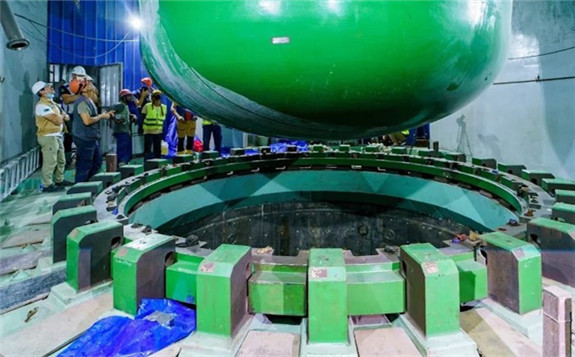 Roopur 1's reactor pressure vessel is maneuvered into position (Image: Rosatom)
Roopur 1's reactor pressure vessel is maneuvered into position (Image: Rosatom)
Likhachov and Hasina had both taken part in an event to mark the installation of the reactor pressure vessel of Rooppur unit 1, the first of two reactors at Bangladesh's first nuclear plant which is currently under construction.
Addressing the event from her official Ganabhaban residence, Hasina said the installation made it "a day of joy and pride" for the Bangladeshi people. From now on, she said "we affirm our position in the nuclear world and contribute to the peaceful use of nuclear technology."
Since nuclear power is low-carbon, Hasina continued, "it is therefore environmentally friendly and helps to combat the adverse effects of climate change. In line with our plans for the development of the country, our power plant will help us achieve the Sustainable Development Goals by 2030 and contribute to a gradual transition to become an industrialised country by 2041."
Likhachov spoke at the Rooppur site: "The development of nuclear power generation will not only solve the problem of energy supply to the Republic of Bangladesh, but will also help the development of the region and raise the living standards of people. Cooperation between Russia and Bangladesh is of a strategic nature. I am sure that Russian and Bengali specialists will have to implement more than one joint project both in the field of energy and in other areas," he said.
Construction of the Rooppur plant began in November 2017. The first reactor should produce power in 2023 and the second in 2024. They are VVER-1200 units.
Rooppur is 160 km northwest of Dhaka on the banks of the Ganges in Pabna district. Hasina said the country's next nuclear power project will be in the south of the country, but did not pecify a site.
Likhachov praised the workforce of 20,000 currently working on Rooppur. He and Hasina discussed the training of Bangladeshi workers and experts to take a leading role in its operation.